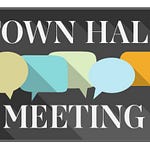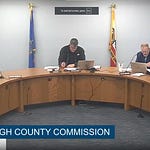Audio Above: Jason Spiess and I discussed this topic on 550AM KFYR radio in Bismarck on December 11th, 2023. You can listen to that audio by clicking play above.
In early December, the Fargo Forum poked the bear by writing an article questioning the city’s growing approach to managing the media and calling its communications department a “newsroom”:
The city of Fargo has a 12-member, centralized communications team whose total salaries are approaching $1 million in the 2024 budget, up from nearly $740,000 this year and just over $590,000 in 2022.
[…]
Mahoney also said the communications team’s salaries represent less than 1% of the city’s $120 million annual budget.
[…]
Some members of the local media dispute that, including Paul Jurgens, longtime news director for KFGO Radio.
Police supervisors used to provide basic information at the scene of a vehicle crash or other emergency that the media could report but don’t anymore.
“They are so concerned about something getting out that is not approved,” Jurgens said.
All requests now must go through the communications team, he said, delaying the flow of information to the public.
Jurgens said the KFGO newsroom has better success getting information for day-to-day reporting from police departments in Grand Forks, Bismarck and Minot.
The biggest concern for Jim Shaw, a Forum columnist, longtime journalist and former news director at KVRR-TV, is that the city did its own interviews with the wounded officers from the July 14 shooting without giving the media an opportunity to sit down with them.
“When the city does it, we don't know what we didn't see. We only know what the city decided that we should see,” he said.
Taxpayer-funded government employees, he said, should not act like journalists.
“That's crossing the line,” Shaw said.
It is highly unusual for a media outlet or individual reporter to call out the strategy or spending that a governmental entity uses - especially when it relates to how the media and reporters interact with that governmental entity - unless they believe that the bridges of real, authentic communication have already been burned.
Can a governmental entity run a “newsroom” without it being a propaganda operation?
The original Forum article also digs into the issue of the city calling its communications team a “newsroom”:
Rather than a “newsroom,” Shaw said, the communications team is a public relations arm.
“By nature, that department is going to function as a way to make the government look good. A journalist is going to do what he or she has to do, regardless of how it looks,” Shaw said.
Several people who teach journalism said while the general public might not care about these distinctions, they should.
Jared Schroeder, associate professor at the University of Missouri School of Journalism, said the community loses when a watchdog journalistic entity isn’t present.
“Because, in the end, the city's gonna watch out for itself,” he said.
All levels of government do their own public relations.
However, according to the Fargo-area reporters quoted in this article, their access to city officials is being limited and redirected to the public relations teams - which makes it harder to get both sides of the story because primary sources are no longer available.
The limiting of media’s access to primary sources is potentially where this crosses the line from public relations to propaganda.
City of Fargo’s Newsroom Attempts To
“Fact-Check” The Fargo Forum
Subsequent to the Fargo Forum’s initial article, the City of Fargo formally responded using its “newroom”:
Fargo has seen tremendous growth in recent years, and as mayor I’m proud to say our City government has continued to adapt to serve the needs of a growing city. One of many ways we have evolved to better serve Fargo is by creating a centralized City communications team that is responsive and works for all City departments. This approach creates efficiencies in staffing across our City government and, in turn, saves taxpayer money. Instead of having communications staff members working separately in different departments, our centralized communications team does more with less while serving all departments and divisions.
When the work of these dedicated professionals is questioned by the local newspaper, it is my duty as mayor to explain the challenging work they are accomplishing. I am proud to defend their efforts in consistently answering journalists’ emails, texts and phone calls well into the late evening and early morning hours on a routine basis (including The Forum). In addition, local journalists have the cellphone numbers of Fargo City Commissioners and can contact us directly – any time – there is no gatekeeping.
Unequivocally, our communications team is consistently working with all City officials every day to release as much information as quickly as possible. By providing facts and data, Team Fargo is working around-the-clock to combat disinformation regarding vital government services.
Watchdog Question: Who should we believe more: the reporters who say their access to city staff and information is being stifled, or the city government?
Forum Responds To City Response’s Rebuttal
One of the worst trends to reach local governments is the advent of these “communications” teams, which act as an intermediary between reporters and public officials.Not only do they sometimes act as a barrier, but they also are intended to put the government in the best light, as if city services were a brand and the public has to be sold.
No: Public officials work for us.
[…]
But this isn’t transparency — it’s produced, stage-managed “news.” It’s all about controlling the message, not about making information more accessible to the public.
Is this how you want your local governments to operate? To adopt corporate marketing and public relations practices?
(The Forum has made this editorial free to the public, read the whole thing here.)
In addition to the audio above, Jason Spiess has written his own article on this issue - and gets into how many government/taxpayer resources are being used to generate content via podcasts as a means of marketing.
Watchdog Commentary: Corporate Media Downsizing and Consolidation Has Magnified The Problem
As most people know, in the last 30 years the media has failed to keep up with technology and its own consumers. This has led to downsizing and consolidation of all media sources.
This problem is most evident in a state like North Dakota because reporters/journalists with experience end up being hired by campaigns and government agencies while media cycles through reporters, most of whom are relatively new to the business and the state.
Newspapers have been hardest hit by this trend, which is why more and more content is syndicated by newspapers rather than being written by local reporters.
In addition to the experienced reporters moving into government public relations roles, there has been a vacuum created by the consolidation and downsizing which has created a market for non-profit news agencies to pop up.
In the last six months, two such entities have gone public.
The North Dakota News Cooperative launched to offer content to North Dakota media, and has taken on the role of a manager of public opinion polling.
The North Dakota Monitor also launched strong in December.
Both of these entities are 501©3 organizations - which is the same designation that the North Dakota Watchdog Network has.
Both the N.D. Monitor and N.D. News Cooperative have legitimate experienced reporters as their management but there is always the inherent suspicion as to funding of such operations. (Note: Because I have prior dealings with the reporters and media folks behind both of these organizations, I have a little more hope than some as to how they will operate and that they will be beneficial to the public.)
Under the North Dakota Watchdog Network banner, I have always tried to use journalistic approaches to establish facts prior to outlining a policy agenda - but I don’t claim to be a journalist. My goal has always been to inspire reporters and journalists to deep deeper on issues that are not always the easiest to explain.
The case of the Fargo Forum calling out the City of Fargo for running a propaganda machine is really just the first and most obvious layer of this issue. Hopefully, the Forum will keep digging and exposing how all government is operating in this way.
This is the sort of journalism the public wants from newspapers and other media outlets. There are millions and millions of advertising dollars at stake for the media outlets that dare to take this issue on - both from the government(s) themselves, and the businesses that profit from these government policies that are being spun.
















Share this post